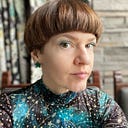Member-only story
The Surprising Lackluster of Wonder Woman 1984
And its Equally Surprising Strengths
**Contains Spoilers**
It would be a bit harsh to ask where Wonder Woman 1984 “went wrong” because at worst, it was mediocre, not bad. The harshest it deserves is a solid C — still ranking it slightly higher than the average superhero film. It’s a problem half-derived from having a first outing that was so good, it’s almost as if the sequel had to be lesser by some unwritten law of the nature of genre film. In short: Wonder Woman 1984 was great in all the ways superhero films often fail, and a failure in all the ways superhero films usually succeed.
The genre tends to revolve around some civilization-ending threat. So it follows that if there is a litmus test of whether a superhero film will deliver, it might be whether the gravitas of that threat feels real. If it feels abstract or silly (in a film that is ostensibly taking itself seriously), it fails. The first iteration of Patty Jenkins’ and Gal Gadot’s Wonder Woman (2017) had the realism-benefit of choosing an existing era of threats from history. Specifically how WWI would have felt to a world that had not yet had a World War, as personified by Steve Trevor (Chris Pine), and the more literal personification of war itself as Ares, the God of War and Diana’s antagonist (David Thewlis). Steve’s sincere…
